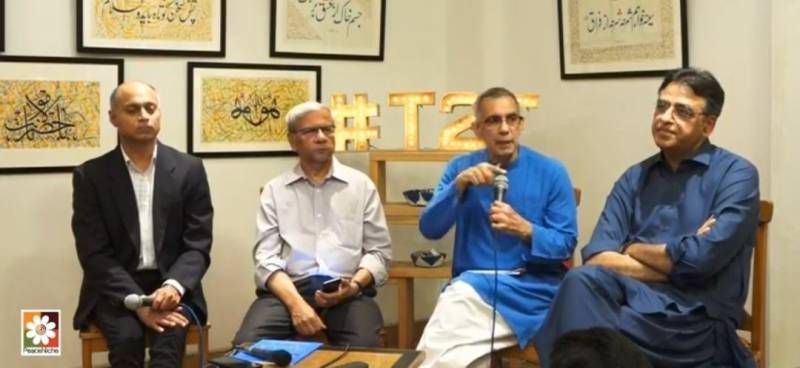
“We had to go to IMF, in one way or the other,” said Dr. Kaiser Bengali while addressing members from the civil society, businesspersons, students and academics at a panel discussion organized by The Second Floor Café, Karachi. Dr. Bengali along with notable political economist, Dr. Akbar Zaidi and Ex-Finance Minister, Asad Umar discussed the fate of Pakistan`s economy.
The discussion moderated by Khurram Hussain from Dawn newspaper broadly highlighted the need for structural changes in the economy. Though both the academics took turns to criticize the incumbent government, Akbar Zaidi was of the view that Asad Umar was lucky enough to exit the finance ministry at the right time, the economic turmoil ahead might be worse.
“If Hafeez Sheikh does even one-tenth of what he did back in Zardari`s tenure, then you can only imagine, where we are headed, things can be much worse”, remarked Zaidi.
Umar responding to Zaidi`s remarks earlier, which were pertaining to the IMF and alternatives, reaffirmed his stance that going to IMF was inevitable. However, he was of the view that there was an imminent need to explore alternatives and the incumbent government did pursue alternatives while reaching out to Beijing, UAE and other friendly countries.
Umar stressed upon the fact that despite months of delayed negotiations, the government of the day was very much adamant to handle the economic turmoil. He clearly remarked:
“What has been signed now with the IMF is far less stringent than what had to be signed before”. Concerning his predecessor, Umar tried to differentiate between 2013 and when he took oath as the finance minister. According to Umar Mr. Dar, back in 2013 had foreign reserves up to seven and a half months. Umar, on the other hand, had reserves for only twenty days or so.
The discussion moved on to Dr. Bengali where he commented upon the structural lacunae of the economy and how the default at hand transcends through the last two decades. He presented his analysis with average growth rates, which were far below par compared to developing sector economies.
In his remarks, Dr. Bengali tilted the discussion towards the capacity of the economy to perform. He highlighted two major economic problems concerned with the dollar gap and the rupee gap. “In order to reduce the dollar gap, mentioned above one has to completely ban imports of non-essential consumer goods”, remarked Dr. Bengali. His comments further accentuated the moral and political bankruptcy of the state, which has led to such gaps. Dr. Bengali was of the view that the rupee gap will not reduce with increased tax collection as the economy is in no position to generate further revenue.
The panel discussion was followed by questions from the audience which were mainly pertaining to the government`s future policies to facilitate the economy.
However, the panelist could not come up with a feasible alternative, but the consensus was that the economic turmoil might worsen and there are tough times ahead.
The discussion moderated by Khurram Hussain from Dawn newspaper broadly highlighted the need for structural changes in the economy. Though both the academics took turns to criticize the incumbent government, Akbar Zaidi was of the view that Asad Umar was lucky enough to exit the finance ministry at the right time, the economic turmoil ahead might be worse.
“If Hafeez Sheikh does even one-tenth of what he did back in Zardari`s tenure, then you can only imagine, where we are headed, things can be much worse”, remarked Zaidi.
Umar responding to Zaidi`s remarks earlier, which were pertaining to the IMF and alternatives, reaffirmed his stance that going to IMF was inevitable. However, he was of the view that there was an imminent need to explore alternatives and the incumbent government did pursue alternatives while reaching out to Beijing, UAE and other friendly countries.
Umar stressed upon the fact that despite months of delayed negotiations, the government of the day was very much adamant to handle the economic turmoil. He clearly remarked:
“What has been signed now with the IMF is far less stringent than what had to be signed before”. Concerning his predecessor, Umar tried to differentiate between 2013 and when he took oath as the finance minister. According to Umar Mr. Dar, back in 2013 had foreign reserves up to seven and a half months. Umar, on the other hand, had reserves for only twenty days or so.
The discussion moved on to Dr. Bengali where he commented upon the structural lacunae of the economy and how the default at hand transcends through the last two decades. He presented his analysis with average growth rates, which were far below par compared to developing sector economies.
In his remarks, Dr. Bengali tilted the discussion towards the capacity of the economy to perform. He highlighted two major economic problems concerned with the dollar gap and the rupee gap. “In order to reduce the dollar gap, mentioned above one has to completely ban imports of non-essential consumer goods”, remarked Dr. Bengali. His comments further accentuated the moral and political bankruptcy of the state, which has led to such gaps. Dr. Bengali was of the view that the rupee gap will not reduce with increased tax collection as the economy is in no position to generate further revenue.
The panel discussion was followed by questions from the audience which were mainly pertaining to the government`s future policies to facilitate the economy.
However, the panelist could not come up with a feasible alternative, but the consensus was that the economic turmoil might worsen and there are tough times ahead.
